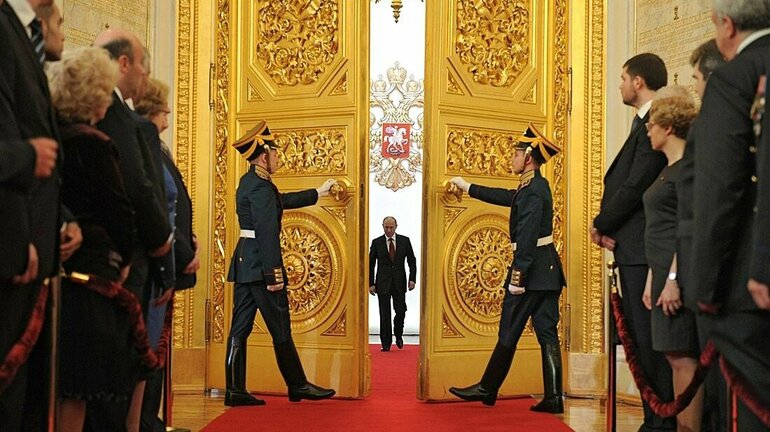The early run-up to the Russian election

Although Russia’s 2018 presidential election campaign does not officially begin until the new year, to many observers it feels as if it has already been going on for a while now. Newspapers have been reporting regularly since at least the 2016 parliamentary election on rumours about when and whether Vladimir Putin will announce his candidature for a fourth presidential term. Debate and discussion in the curtailed Russian public sphere about how that campaign will be run has been ongoing since the cooldown from the euphoria of Moscow’s annexation of Crimea in 2014.
In a consolidated and increasingly personalist authoritarian regime like Russia’s, the question is not whether Putin will win a fourth term, but whether he will choose to run in the first place, and how. The regime’s last major brush with serious public discontent in 2011 and 2012 was met with targeted repression and further centralisation around the president. Since then, the annexation of Crimea has provided a durable boost in public opinion for the president, and he is in a commanding position to win in 2018.
Yet all is not well in the land of Kremlin election-planning. Much of the debate in both state-loyal and opposition-minded newspapers and in online media seems to reflect genuine uncertainty in the regime over how to conduct this election. Part of this insecurity stems from frustrating lessons learnt from recent lesser-order elections in the country.
The parliamentary election in autumn 2016 was a case of worrying failure masquerading as profound victory. Under a new electoral system, the regime’s dominant party United Russia won 343 out of 450 seats, including 203 of the 225 single-member district seats and over 50 per cent of the party-list vote. Yet the official national turnout was 48 per cent—the lowest in post-Soviet Russia’s history. And this figure masked heavy regional variation, including record lows in Moscow (35 per cent) and St Petersburg (32 per cent). United Russia’s increased majority in the Duma felt hollow, reflected even in pro-regime election post-mortems.
A paradox of legitimacy
Russia’s highly authoritarian ethnic republics of the North Caucasus and the Volga River basin as well as government-dependent groups such as white-collar employees, state factory workers, and pensioners are perceived as the basis of regime support. But how can one be sure this is true support, rather than a lack of alternatives in a highly state-capitalist system with uneven respect for the rule of law?
Russian political scientist Nikolai Petrov argues that post-Crimean politics in Russia suffers from a paradox of legitimacy. While Putin’s position as national leader remains undisputed, he has the legitimacy of a warlord or a military victor. That is, in Weberian terms, a highly charismatic form of political authority that is inherently unstable compared with the regularised electoral legitimacy that contemporary authoritarian regimes often strive for.
Recent scholarship in political science supports this claim – the facade of democratic legitimacy, regular elections, and a sense that the regime both enjoys genuine popular support and faces a clear spectre of punishment for failing to mobilise are vital elements of nonmonarchical authoritarian polities. Even when citizens know the rules are unfair and the cards are stacked against the opposition, so long as a regime considers elections and its own popularity fundamental to its legitimacy, sham electoral rituals are vital. Putin’s Russia famously relies on polling information and institutional substitutes to act as conveyer belts of public opinion to the regime.
Two scenarios were particularly discussed by pro-Kremlin political experts after the 2016 parliamentary election. The first was a so-called Central Asian scenario—reminiscent of elections in Russia’s ethnic republics—where Putin would win hugely in the popular vote in a noncompetitive plebiscitary fashion, confirming his national leadership position in a ritual of mass confirmation. This, however, could be dangerous if the problem of low turnout continued, undermining the symbolism and mobilising power of the election.
The second scenario was an election with seemingly competitive elements, allowing a real liberal challenge from someone deemed not to have been co-opted. This would bring its own dangers. Semicompetitive elections in authoritarian regimes can produce unexpected outcomes, and the choice of Alexei Navalny would legitimise a dangerous and charismatic opponent. But it would allow Putin the fantastic PR opportunity to show his ability to win the loyalty of most Russians and humiliate the liberal opposition in the process.
A Putin shoo-in
Gubernatorial and municipal elections in September 2017 seemed to provide evidence of continued thinking along the lines of the first scenario: no surprises, big wins. And the votes showed how problematic this strategy continues to be, with turnout so low in some places (Moscow municipal councils especially) that liberal opposition candidates gained seats because regime supporters stayed at home.
Putin has yet to formally announce his 2018 presidential campaign; that is expected to happen in late November or early December. The surprise candidature of liberal socialite and TV personality Ksenia Sobchak, who claims to be ‘against all’, seems designed to elicit scenario number two, but from a position unwilling to find a truly unco-opted liberal for the job. However, mockery from national-liberal Navalny’s persistent if illegal campaign in the provinces and much of the liberal Russian media quickly undercut Sobchak’s campaign.
It is still early days in the 2018 campaign, as formal procedures do not begin until mid-December and TV spots do not open up until February. Through either plebiscitary acclamation or a fiercer, no-holds-barred fight, Putin is highly likely to be elected Russian president once more. But whether his election reinforces or undercuts the regime’s legitimacy and the elite’s sense of security remains to be seen.
Julian Waller is a Ph.D Candidate in the Department of Political Science at George Washington University, Washington DC. He is Visiting Scholar at ZOiS.